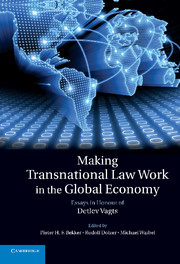Book contents
- Frontmatter
- Contents
- List of contributors
- Foreword: the transnationalism of Detlev Vagts
- List of cases cited
- List of abbreviations and acronyms
- Introduction: a Festschrift to celebrate Detlev Vagts' contributions to transnational law
- 1 Detlev Vagts and the Harvard Law School
- 2 Constructing and developing transnational law: the contribution of Detlev Vagts
- I International law in general
- 3 ‘Hegemonic international law’ in retrospect
- 4 Textual interpretation and (international) law reading: the myth of (in)determinacy and the genealogy of meaning
- 5 The changing role of the State in the globalising world economy
- 6 Sources of human rights obligations binding the UN Security Council
- 7 Is transnational law eclipsing international law?
- 8 Participation in the World Trade Organization and foreign direct investment: national or European Union competences
- 9 From dualism to pluralism: the relationship between international law, European law and domestic law
- 10 Transnational law comprises constitutional, administrative, criminal and quasi-private law
- 11 Founding myths, international law, and voting rights in the District of Columbia
- 12 The tormented relationship between international law and EU law
- 13 International law scholarship in times of dictatorship and democracy: exemplified by the life and work of Wilhelm Wengler
- II Transnational economic law
- III Transnational lawyering and dispute resolution
- Bibliography of Detlev Vagts
- Index
9 - From dualism to pluralism: the relationship between international law, European law and domestic law
from I - International law in general
Published online by Cambridge University Press: 17 November 2010
- Frontmatter
- Contents
- List of contributors
- Foreword: the transnationalism of Detlev Vagts
- List of cases cited
- List of abbreviations and acronyms
- Introduction: a Festschrift to celebrate Detlev Vagts' contributions to transnational law
- 1 Detlev Vagts and the Harvard Law School
- 2 Constructing and developing transnational law: the contribution of Detlev Vagts
- I International law in general
- 3 ‘Hegemonic international law’ in retrospect
- 4 Textual interpretation and (international) law reading: the myth of (in)determinacy and the genealogy of meaning
- 5 The changing role of the State in the globalising world economy
- 6 Sources of human rights obligations binding the UN Security Council
- 7 Is transnational law eclipsing international law?
- 8 Participation in the World Trade Organization and foreign direct investment: national or European Union competences
- 9 From dualism to pluralism: the relationship between international law, European law and domestic law
- 10 Transnational law comprises constitutional, administrative, criminal and quasi-private law
- 11 Founding myths, international law, and voting rights in the District of Columbia
- 12 The tormented relationship between international law and EU law
- 13 International law scholarship in times of dictatorship and democracy: exemplified by the life and work of Wilhelm Wengler
- II Transnational economic law
- III Transnational lawyering and dispute resolution
- Bibliography of Detlev Vagts
- Index
Summary
Introduction
As a young German Visiting Researcher at Havard Law School in 1994–5, Detlev Vagts' class on Transnational Legal Problems opened up a new perspective on international law for me: pragmatic and pluralist rather than doctrinal and separated into public law, private law and criminal law. In addition, the Jubilee impressed me with his keen interest in German law and culture. Thus, while being forced to rethink the traditional German approach to all things legal, Detlev made the young German student feel at home both intellectually and personally. The following contribution to his Festschrift attempts to follow Detlev's example.
For one of the fathers of the transnational law approach, it will hardly come as a surprise that both the German and the US legal orders are faced with an increasing fragmentation of the legal landscape, in which domestic law cannot but pay attention to European, international and, at times, foreign law. However, both are also concerned with democratic legitimacy and the preservation of domestic prerogatives of parliaments and courts. In Europe, the matter becomes even more complicated. While European law is not ‘domestic’ in character, but has been established by a treaty between States, its law is ‘supranational’, e.g. directly applicable to individuals in its Member States. Thus, the European legal order faces an additional difficulty when faced with international decisions: it must first decide ‘on which side it is’, in other words, whether it regards its own legal order, in a monist perspective, as part of international law, or as a separate legal order that faces international law the same way as a domestic legal order.
- Type
- Chapter
- Information
- Making Transnational Law Work in the Global EconomyEssays in Honour of Detlev Vagts, pp. 132 - 153Publisher: Cambridge University PressPrint publication year: 2010
- 2
- Cited by



